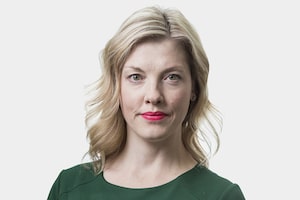Voters at an advance polling station in Carstairs, Alta., on May 26. Albertans go to the polls on May 29.Jeff McIntosh/The Canadian Press
Jason Kenney is not a part of this Alberta election campaign. But the former premier’s policies and leadership still haunt the closing days of the tight race between the NDP and the party he helped to create.
Danielle Smith has been United Conservative Party Leader for just eight months. And her recently revived political career relies on a selective mix of disavowing Mr. Kenney’s pandemic health restrictions and vaccine mandates, while building on his economic vision. Voters are still trying to figure out what the UCP is without Mr. Kenney’s strong, some would say overbearing, persona at the helm.
Nowhere is his presence more clear than in the NDP campaign pitch to raise corporate taxes. It’s a direct repudiation of Mr. Kenney’s laserlike focus while in office in making the corporate tax rate the lowest among the provinces. In 2020, he accelerated the schedule to reduce the rate, even as the provincial budget teetered on the edge of an abyss after the pandemic-induced oil price shock – a move he said would help revive the economy.
The corporate tax rate now sits at 8 per cent. Rachel Notley’s NDP says it would increase the tax to 11 per cent, still marginally lower than all other provinces. Her party, if elected, would also eliminate the small business tax completely.
It’s a tax plan that could end up being pivotal in the election outcome. That particular part of the NDP platform has jolted some business-minded Calgary voters still worried about the fragility of the economic recovery. Conservatives also base their criticism on the record of Ms. Notley in office from 2015 to 2019 – a time, of course, far more influenced by low oil prices than any government policy.
Still, that hasn’t stopped the political denunciations, including from former prime minister Stephen Harper in a video message on Friday. Part of the question is economic: Whether a tax cut brings in enough new business to offset the reduction in revenues.
But the corporate tax debate also speaks to Alberta’s most enduring quandary: The desire by most to live in a low-tax jurisdiction – and to win at attracting new investment over other provinces and U.S. states – against the need for more budget and economic stability than is provided by volatile oil and natural gas prices.
Of course Ms. Smith has her own policies. She got rid of the top echelons of staff at Alberta Health Services when she took over as Premier. It’s her government that announced the arena deal for Calgary, just days before the writ drop. Part of the party’s platform is what it calls the “Taxpayer Protection Act,” which would demand a referendum on the question of increasing personal or business taxes.
And where Ms. Smith has particularly distinguished herself as UCP Leader is in her ability to listen to her MLAs. Decisions are not top down as they were under Mr. Kenney’s leadership – the former federal cabinet minister was famous for keeping his own counsel. Ms. Smith has shone in her willingness to change her mind on an issue or policy, almost to a fault, some say. But the current show of relative unity is key for a party now famous for its internal battles – a tension likely to resume when the election is done.
On the other hand, a UCP led by Mr. Kenney probably would not have hamstrung itself by promising to hold a referendum every time it wants to increase taxes, a move that could be financially disastrous for the province if and when resource revenues drop again.
Meanwhile, the NDP will win votes from Albertans still deeply disenchanted with the UCP from the Kenney years, whether for his premature call that COVID-19 was over in the summer of 2021, the party’s management of labour negotiations with health care workers, or its cuts to postsecondary funding. Some people in Calgary’s northeast will still shun the UCP based on Mr. Kenney’s comments in 2020 that multi-generational living and large gatherings of South Asian families were partly responsible for a high rate of COVID-19 spread.
Mr. Kenney’s favourite Fair Deal panel idea, for Alberta to leave the Canada Pension Plan and create its own provincial fund, has been mostly avoided as an issue by the UCP in this election campaign. But that hasn’t stopped the NDP from emphasizing that the unpopular UCP plan is still in the queue.
And when the two leading leaders were asked during the debate which of their opponent’s policies they admire, Ms. Notley referred to two Kenney-era actions: the creation of the Alberta Indigenous Opportunities Corp. and the boost to the province’s Film and Television Tax Credit.
Before leaving office last year, Mr. Kenney warned that “recrimination and relitigation of the divisive COVID-19 debates” is a ticket to political irrelevancy for the UCP. It remains to be seen whether voters think the party truly can leave those battles behind it.
While Ms. Smith has said she wants to relegate the “dark days” of the pandemic to history, she also staged her political comeback, at least in part, in building a media community around her criticism of federal and provincial pandemic policies.
She also didn’t totally leave those days behind her when she became Premier. She established a $2-million panel to review the legislation and governing processes the province used to manage COVID-19. Ms. Smith called Alberta’s Justice Minister on behalf of a radical Calgary street preacher charged with mischief – after he incited protesters to block public property at the border crossing at Coutts in 2022. The province’s ethics commissioner called her attempt to interfere with the case a “threat to democracy.”
Mr. Kenney might not be a part of this election campaign. But the former premier still looms large over the debate.
 Kelly Cryderman
Kelly Cryderman